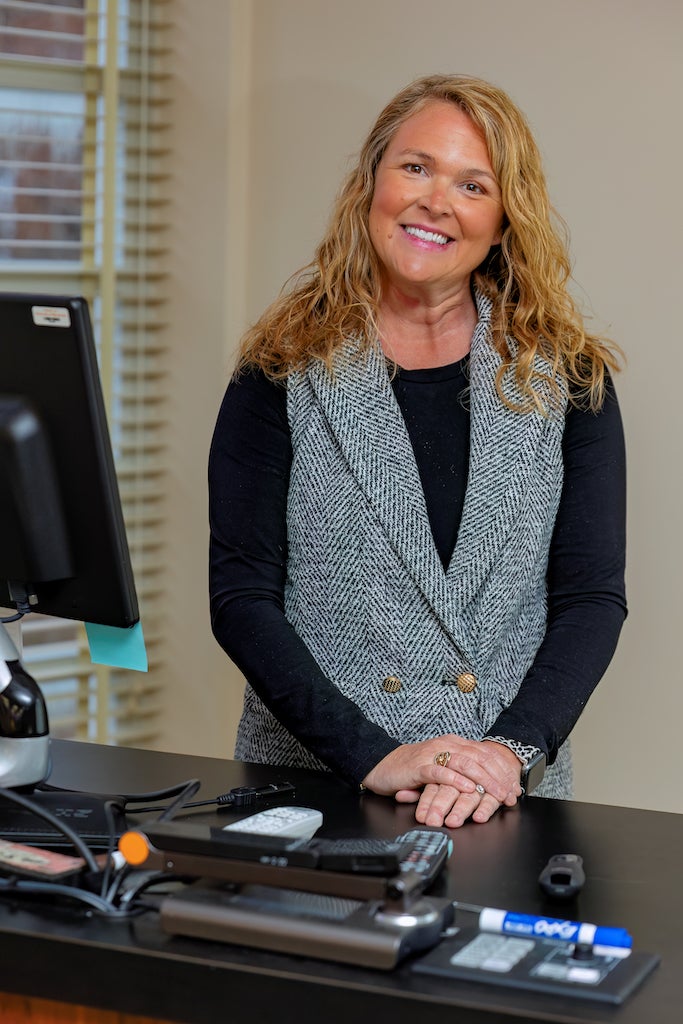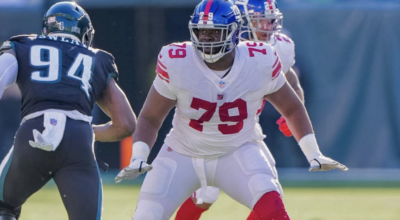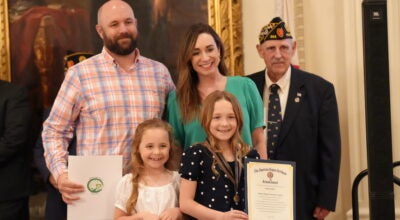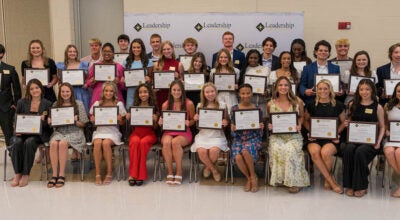PROFILE: Educating tomorrow’s educators: Davis’ passion for education spreads to Shelby County’s communities
Published 4:03 pm Wednesday, March 20, 2024

- Jennifer “JiJi” Davis’s passion for education continues to spread to others—making a positive impact on Shelby County. (For the Reporter/Jason Homan)
|
Getting your Trinity Audio player ready...
|
By SCOTT MIMS | Special to the Reporter
Dr. Jennifer “Ji Ji” Davis at the University of Montevallo has wanted to be an educator for as long as she can remember—so much so that her brother used to get concerned when Davis spoke aloud to imaginary students.
“I was that kid that always would ask my teacher for the extra copies, and then I would go home and play school with them every single day,” Davis recalls from her childhood. “I played school my entire life, and I would say that is still what drives me today is, of course, my love for children; but more than anything it is the creativity and the challenge of meeting the needs of all students in the classroom.”
Hearing Davis speak about education, it doesn’t take long to figure out how much she loves her job. She says it is also her hobby, and it doesn’t even seem like a “job” at all.
Davis is in her 15th year of teaching at UM, where she also serves as the program coordinator of Elementary, Elementary/Collaborative, and Deaf and Hard of Hearing—a role she has held for four years as of fall 2023. She is also the facilitator of Montevallo Connection, a program that brings together teachers, administrators and students in Montevallo’s elementary, middle and high schools as well as UM. Davis also coordinates the placement of student-teachers in surrounding areas.
“I teach elementary methods courses. That’s my favorite part,” Davis says. “I focus on classroom management in the elementary grades and social studies, so both of those are a passion of mine.”
If education runs through Davis’ veins, then so does Shelby County. A Calera High School alumna, Davis went on to graduate from UM in 1999 and returned to earn her graduate degree in administration. She taught elementary in Shelby County Schools and then moved into an administrative role, later returning again to UM to prepare pre-service teachers. Now, her four children attend schools in Shelby County.
“For me, it’s like a full circle moment because I’m able to now help prepare these pre-service teachers to go back into Shelby County and surrounding communities,” Davis says.
Preparing future educators
When students first come to Montevallo, they spend the first few years getting their general education requirements. Then, they roll into block courses. During the first block, Foundations Block, students take classes but also observe for 50 hours in a classroom setting to make sure teaching is truly what they want to do.
Every now and then, Davis says, a student will come up to her at the end and say, “It’s not for me” and Davis appreciates their candor.
“I’m thankful that they understand that early on and can find and pursue a career that they’re passionate about,” she says.
Second is Methods Block, where students learn literacy strategies, classroom management strategies and technology strategies to utilize in the classroom. Third is Pre-Internship Block, where they learn strategies for teaching social studies, math, literacy and science.
The final step is the internship, which is like a regular job from 7:30 a.m. until 3:30 p.m. each day of the school week.
At the end of each semester, a professional disposition conference is conducted with each student in a series of special meetings. Davis explains how the disposition conferences work.
“We can say, ‘Here are the things that we think you excel in, or maybe you tell us some areas you would like to focus on going into the next block,’ so it’s almost a conversation definitely I would have with my own kids, but I had much rather them have these conversations with me than a future employer; a future principal,” she says. “The cool thing about our program in all the blocks is that you come to class for eight weeks and we teach you all the content, and for the second eight weeks you’re actually placed in a public school so that you’re able to practice this, and then we go in the schools to check on them and assist when needed.”
With the ongoing teacher shortage, Davis says elementary teachers are getting hired prior to graduation. Once they have submitted final portfolios, they receive sub pay until the end of the semester prior to graduation, and then they are able to roll into a permanent job.
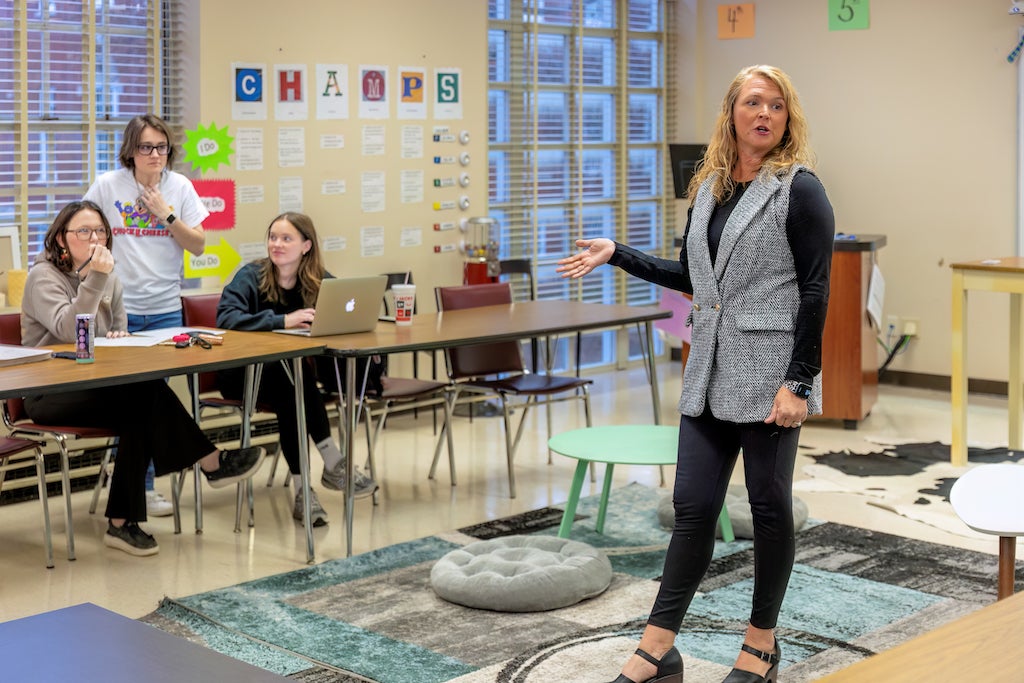
Getting teachers to the classroom
Davis estimates that between 25-30 students go through her program each semester at UM. This, of course, has a tremendous impact upon Shelby County and surrounding communities through student-teacher placements. In addition, much thought goes into where each student-teacher is placed, based on the needs of both the student and the school.
“When we ask the county and surrounding counties to place our students, sometimes it’s this student needs to be here because they’re an athlete and they have to get back to practice to keep their scholarship, or this student works downtown and so they’ve got to be at this school to get there,” Davis says. “This student is a parent and so they need to be at this school to be able to pick their kids up on time. This student may not have transportation and so they’ve got to be at this school to ride with this friend. It’s just so cool within our class—all the different diverse hobbies and needs these students have as well.”
When asked what sets the elementary education program at UM apart from other programs, Davis says she thinks it is because the majority of their professors taught in public schools for quite a while. She also cites the partnerships with local communities in Shelby County that allow students into the schools to practice hands-on what they have learned at UM.
“Even during the (COVID-19) pandemic, our students were allowed to go into the schools in Shelby County, and I was so blown away by that, and even when the schools eventually had to shut down, our students rolled online with them. So it was the best experience in a terrible situation,” she says.
Projects also introduce real-world experience to the students. During the fall 2023 semester, when Davis was teaching social studies, her class did a lesson on community helpers with the assistance of Davis’ husband, Montevallo Fire Chief Brad Davis.
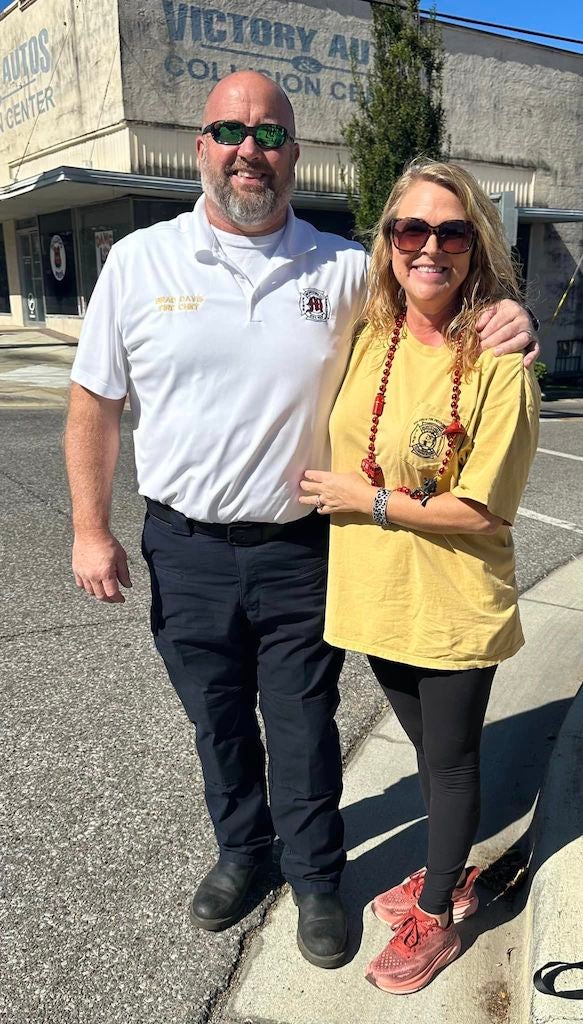
“Because we’re so close to the fire department, at the end of our lesson we walked right over to the fire department, and they were waiting on us to ask questions,” she recalls. “That’s a cool thing too about being in a community like this, is that we share resources across the board.”
Montevallo Connection is another way she helps to connect people in the community, specifically at Montevallo. Four times a year, principals and teachers from Montevallo Elementary, Middle and High schools join UM faculty members to explain projects they have going on and ways they can assist each other. For example, UM’s Foreign Language Department might provide interpreters to the elementary school, or UM athletes might read to kids to help inspire them.Davis recalls a particularly heartwarming example when some girls at Montevallo High School did not have prom dresses to wear:
“They reached out to our Family Consumer Sciences Department, and they rounded up the dresses and not only found them but they hemmed them and they altered them, and it was just so good,” she remembers. “That’s such a special part about this community, is that we take care of each other. Everybody just takes care of everybody, so it’s a cool place to be.”
Davis has four daughters. Avery is a senior at UM, while Carter is a senior at Montevallo High School; Bradli is a senior at Thompson High School and Graci is married and lives with her husband, Jake, and their daughter, Clara, on Westpoint military base in Westpoint, NY. In addition, Dr. Davis lives on a farm where upon returning home each day, she feeds pigs and cows. She also delivers Meals on Wheels to people in the community for two Fridays of each month.
“I love those people. They are my friends, and one lady was my P.E. teacher in middle school, and she’s bedridden now and I love those people. They have become family to me,” she says.
Perhaps Davis’ love for education might best be observed on a typical drive home.
“Because we know that (students) don’t all learn the same, and we know that they all need to be exposed to different ways of instruction, and so for me it is always driving home going, ‘How am I going to do this differently for this student?’ And that has been from elementary students to students in this college classroom for me to figure out what’s the best way for them to learn the content, and that’s exciting to me,” she says.
After serving as an educator for 24 years, Davis once thought that at this point she would be thinking of different options for her life, but in reality, she says there is nowhere else she’d rather be.
“I love it, I really do,” Davis says. “And now that I’m at the point where I can stop, I don’t want to stop.”
